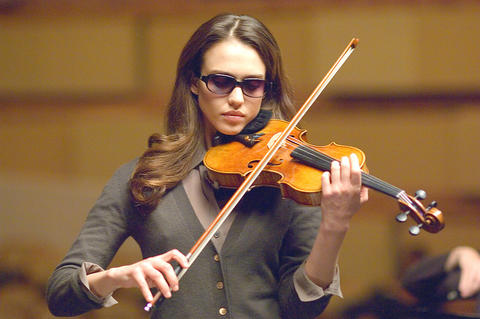"I want to see the world like everyone else," the blind violinist Sydney Wells (Jessica Alba) whines at the beginning of The Eye, the latest Western deconstruction of a successful Asian horror movie.
If only Alba's narration - as vapid as her acting - were the film's only problem. Blind since the age of 5, Sydney is unprepared when a cornea transplant not only restores her sight but also allows her to see dead people. As the departed stalk her in elevators and accost her in corridors, Sydney resolves to trace the origins of her new peepers. Naturally, every step of this journey must be spelled out - twice.
The original Eye, directed by Danny (彭發) and Oxide (彭順) Pang, was an insinuating ghost story that cleverly exploited cinema's fascination with all things ocular. But what the Pangs accomplished with little more than a talent for framing and focus, this remake (directed by David Moreau and Xavier Palud) fails to achieve, despite an arsenal of strobe lighting and crashing chords. The debt owed by both movies to The Sixth Sense and The Mothman Prophecies is only more obvious.

PHOTO: COURTESY OF LIONSGATE
Louder and more literal than its inspiration, The Eye benefits from a spiky performance by Alessandro Nivola as Sydney's rehabilitation counselor. "Your eyes are not the problem," he tells her at one point. He is so, so right.

One of the biggest sore spots in Taiwan’s historical friendship with the US came in 1979 when US president Jimmy Carter broke off formal diplomatic relations with Taiwan’s Republic of China (ROC) government so that the US could establish relations with the People’s Republic of China (PRC). Taiwan’s derecognition came purely at China’s insistence, and the US took the deal. Retired American diplomat John Tkacik, who for almost decade surrounding that schism, from 1974 to 1982, worked in embassies in Taipei and Beijing and at the Taiwan Desk in Washington DC, recently argued in the Taipei Times that “President Carter’s derecognition

This year will go down in the history books. Taiwan faces enormous turmoil and uncertainty in the coming months. Which political parties are in a good position to handle big changes? All of the main parties are beset with challenges. Taking stock, this column examined the Taiwan People’s Party (TPP) (“Huang Kuo-chang’s choking the life out of the TPP,” May 28, page 12), the Democratic Progressive Party (DPP) (“Challenges amid choppy waters for the DPP,” June 14, page 12) and the Chinese Nationalist Party (KMT) (“KMT struggles to seize opportunities as ‘interesting times’ loom,” June 20, page 11). Times like these can

Dr. Y. Tony Yang, Associate Dean of Health Policy and Population Science at George Washington University, argued last week in a piece for the Taipei Times about former president Ma Ying-jeou (馬英九) leading a student delegation to the People’s Republic of China (PRC) that, “The real question is not whether Ma’s visit helps or hurts Taiwan — it is why Taiwan lacks a sophisticated, multi-track approach to one of the most complex geopolitical relationships in the world” (“Ma’s Visit, DPP’s Blind Spot,” June 18, page 8). Yang contends that the Democratic Progressive Party (DPP) has a blind spot: “By treating any

You can tell a lot about a generation from the contents of their cool box: nowadays the barbecue ice bucket is likely to be filled with hard seltzers, non-alcoholic beers and fluorescent BuzzBallz — a particular favorite among Gen Z. Two decades ago, it was WKD, Bacardi Breezers and the odd Smirnoff Ice bobbing in a puddle of melted ice. And while nostalgia may have brought back some alcopops, the new wave of ready-to-drink (RTD) options look and taste noticeably different. It is not just the drinks that have changed, but drinking habits too, driven in part by more health-conscious consumers and